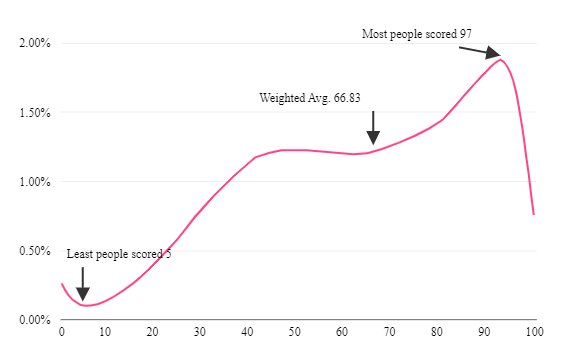The internet, in its infinite wisdom, has birthed many strange trends. Among them, Average Rice Purity Test stands out, not just for its absurdity, but for its unexpected popularity. This seemingly harmless quiz, purporting to measure one’s “purity” based on their life experiences, has captivated millions, sparking heated debates and introspective anxieties. But what exactly is the Rice Purity Test, and how does it manage to hold such sway over us?
The test, often presented as a series of yes/no questions, assigns a numerical score based on your responses. This score, ranging from 0 (pure as freshly fallen snow) to 100 (seasoned rice veteran), supposedly reflects your level of “innocence” or lack thereof. Questions delve into personal experiences, from holding hands to trying alcohol, assigning higher scores to activities deemed “impure.”
The Premise
The Appeal
The test’s allure lies in its simplicity and relatability. It taps into our inherent curiosity about ourselves and our place in the social spectrum. It offers a seemingly objective measure of something highly subjective: our level of experience with “adult” life. In a world obsessed with labels and categories, the Rice Purity Test provides a quantifiable, if dubious, way to understand ourselves and compare notes with others.
The Impact
However, the test’s impact extends far beyond harmless fun. It can trigger insecurity and anxiety, particularly in young adults navigating their identities. The pressure to conform to a certain “purity” level can be immense, leading to feelings of inadequacy or shame for not fitting the mold. The test’s heteronormative and often classist assumptions can further alienate and marginalize those who don’t fit its narrow definition of experience.
Beyond the Score
Beyond the superficiality of the score, the Average Rice Purity Test raises important questions about how we define and measure innocence. Is it truly binary, pure or impure? Does it hinge solely on sexual experiences or encompass a broader spectrum of life choices? Can we quantify something as complex and personal as innocence with a simple yes/no quiz?
The answer, of course, is no. Innocence is subjective, shaped by individual experiences, cultural norms, and personal values. Reducing it to a number disregards the nuances of our lives and the richness of our experiences. It ignores the fact that innocence can coexist with knowledge, that exploration and experimentation are not inherently impure, and that maturity comes in many forms.
The Antidote
Instead of obsessing over a score dictated by an arbitrary quiz, we should focus on embracing our unique journeys. Let’s celebrate the diversity of experiences, the fluidity of identities, and the messiness of growing up. Let’s value personal growth over purity, self-acceptance over societal expectations.
The Rice Purity Test may be a silly internet fad, but it offers a valuable lesson. It reminds us of the dangers of reducing complex human experiences to quantifiable metrics. It compels us to question the arbitrary standards we hold ourselves and others to. And most importantly, it encourages us to celebrate the beautiful, messy, and ever-evolving tapestry of our individual lives, free from the shackles of a purity score.
So, the next time you encounter the Rice Purity Test, remember its limitations. Don’t let it dictate your worth or define your journey. Instead, use it as a springboard for deeper reflection. Ask yourself: what does innocence truly mean to you? What experiences have shaped your understanding of the world? And most importantly, how can you embrace your own unique path without seeking validation in a score?
In the end, the truest measure of our lives lies not in a number, but in the richness of our stories, the depth of our connections, and the courage to be authentically ourselves. Let’s celebrate that, instead of chasing the elusive and ultimately meaningless title of “purest rice.”



